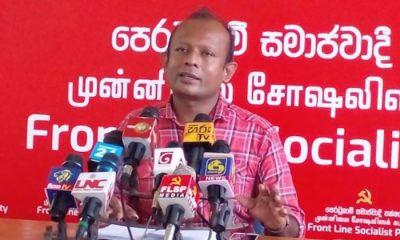Business
‘IMF putting pressure on Sri Lanka to increase tax revenue against its better judgment’

by Sanath Nanayakkare
Waruna Deepthi Rajapaksha, the organizer for Gampaha Division from the United National Party (UNP) said recently at ‘Rathu Ira’ programme on Swarnawahini TV that IMF was putting pressure on Sri Lanka to raise tax revenue despite knowing the fact that it couldn’t be done so swiftly though it is critical.
“The IMF mission team led by Peter Breuer and Katsiaryna Svirydzenka, who visited Colombo from September 14 to 27 gave a press conference last week and said their focus was on restoring macroeconomic stability and debt sustainability in Sri Lanka. Peter Breuer said Sri Lanka has made commendable progress in implementing difficult but much-needed reforms. He said that Inflation is down from a peak of 70 percent in September 2022 to below 2 percent in September 2023, gross international reserves increased by $1.5 billion during March-June this year and shortages of essentials have eased. However, he said, revenue mobilization gains – while improved relative to last year – are expected to fall short of initial projections by nearly 15 percent by year end, partly due to economic factors. He particularly said that it is important to strengthen tax administration, remove tax exemptions, and actively eliminate tax evasion.”
“All these are logical remarks that the government understands. However, these targets can’t be achieved overnight because Sri Lanka is a democracy and not an autocracy. Tax files can’t be opened as fast as we like because of the legal environment in this country.
There are only a few voluntary tax payers in Sri Lanka. All taxes don’t effectively work like the direct PAYE tax because some profit making businesses and good income-earning individuals can’t be forced to pay taxes. When a new business or an individual is asked to pay tax, they have legal provisions where they have four opportunities to seek redress. They can go to tax arbitrators, the courts and even the appeal court to fight it and defer tax payments or avoid paying tax.
There are about 10 million businesses in the country that are functioning as registered businesses. Let’s say 5 million of them are inactive and can’t pay tax. What about the other 5 million businesses? 86% of the total tax revenue is collected from 494 institutions. This means there are many businesses that evade taxes. Lack of consensus and collaboration in the political landscape also make it hard to close such loopholes. I think the IMF understands it. That’s why the IMF said that tax administration in Sri Lanka needs to be strengthened. On their part what they said was logical and reasonable. But on the government’s part it is a process that takes time, “he said.
Business
Code of Ethics for capital market influencers in the pipeline

The Securities and Exchange Commission (SEC) of Sri Lanka is planning to introduce a Code of Ethics or a set of guidelines for the activities of capital market influencers to protect the public from ongoing scams involving the swindling money from potential investors in the share market.
“The market regulator has already identified Blue Ocean Securities Limited and Gladius South Asia as involved in such scams, which are being investigated by the relevant authorities, said Deputy Director General of the SEC Tushara Jayaratne.
The Deputy Director General also said that Gladius was using their their logo in a fraudulent manner to promote their business as well.
He said Blue Ocean has been involved in asking investors to start trading through an app named BOMate Nd. ‘Through this app, you can’t trade shares. But the money transaction goes through this app and the SEC system does not see these transactions, Jayaratne explained.
“The money is going somewhere else, Jayaratne told journalists at a media briefing yesterday held at the SEC auditorium, WTC building, Colombo.
Jayaratne said the SEC has already made complaints to both the Criminal Investigation Department (CID) of the police and the Financial Intelligence Unit (FIU) of the Central Bank.
The Deputy Director General said the second company, Gladius South Asia, has been involved in asking investors not to invest their money in the local stock market, but to do so in the markets in foreign countries.
He also said that the SEC has adopted 12 key capital market development projects to increase the number of capital market investors.
“The Introduction of a Code of Ethics and guidelines for registered investment advisers will help to develop the market in an efficient and effective way, he said.
Jayaratne, however, said that the Sri Lankan share market is not full of scams and that people can have confidence in the market.
“Our market is somewhat free and fair. From the perspective of investors, you also have a responsibility to be careful when investing in the market, he added.
By Hiran H Senewiratne
Business
Norway supports flood-affected communities in Sri Lanka

Norway is providing more than USD 2.4 million to assist those affected by severe flooding in Sri Lanka.
“Norway is contributing emergency assistance to people who have lost both their homes and livelihoods in Sri Lanka. A rapid response is crucial to ensure that those affected have shelter, food, healthcare and support to rebuild their communities,” said Norway’s Minister of International Development, Åsmund Aukrust.
The United Nations estimates that nearly 11 million people have been impacted by catastrophic floods and landslides across large parts of South and Southeast Asia. Sri Lanka, Indonesia, Thailand, Vietnam and Malaysia have experienced record rainfall since 17 November. In total, approximately 1,600 people have lost their lives, and 1.2 million have been forced to leave their homes. Critical infrastructure such as houses and roads has been destroyed, and health risks are increasing due to waterborne diseases and poor sanitation.
“Norway is now contributing NOK 20 million (approx. USD 2 million) to the Red Cross Movement and the UN system in Sri Lanka. These organisations have presence in the country and the capacity to respond quickly based on local needs,” Aukrust said.
Sri Lanka is among the hardest-hit countries. On 28 November, Cyclone Ditwah struck the country, bringing heavy rain and strong winds. The cyclone triggered landslides and caused the most severe floodsing in recent history. The Sri Lankan authorities have led the search and rescue operations and allocated significant resources for immediate relief. “When disasters of this magnitude occur, it is vital that the international community and countries like Norway step up and support local actors in managing the crisis,” Aukrust said.
In addition, the UN Central Emergency Response Fund (CERF) has allocated USD 4.5 million for flood response in Sri Lanka. Around one in ten dollars in the fund comes from Norway.
Norway is also assisting flood-affected communities in Sri Lanka through an immediate response mechanism in the World Food Programme (WFP). The International Labour Organization (ILO) has re-allocated around USD 100,000 in a Norway-funded job generation project, to assist flood-affected participants. Furthermore, Norway has funded a UN expert to help coordinate ongoing relief efforts in the affected areas.
Business
Janashakthi Finance appoints Sithambaram Sri Ganendran as CEO

Janashakthi Finance PLC, formerly known as Orient Finance PLC and a subsidiary of JXG (Janashakthi Group), announces the appointment of Sithambaram Sri Ganendran as the Chief Executive Officer.
Sri Ganendran, who has held the position of Chief Operating Officer since September 2024, stepped in as Acting Chief Executive Officer during the past four months.
He brings with him almost 27 years of extensive experience in banking. Throughout his extensive career, he has held senior management roles in multiple local and international banks, where he acquired in-depth knowledge in operations, branch banking (across retail and SME sectors), operational risk, business continuity management, business integration, process reengineering, operational excellence, sales governance and credit card operations. He holds a plethora of qualifications including an MBA from American City University. He is a Fellow of the Chartered Institute of Management Accountants (CIMA) in the United Kingdom, and an Associate Member of the Chartered Institute of Securities and Investments (CISI), and a member of the Association of Professional Bankers of Sri Lanka.
Rajendra Theagarajah, Chairman of Janashakthi Finance PLC, said, “We are delighted to welcome Sithambaram Sri Ganendran to this important leadership role at a pivotal moment in our journey. His wealth of experience, proven track record, and people-focused leadership style make him well suited to strengthen and guide Janashakthi Finance, ensuring efficient continuity in all ongoing operations.”
The appointment of Sri Ganendran as Chief Executive Officer, reinforces Janashakthi Finance’s deep commitment to seamless operations and growth. It also underscores its dedication to vision of delivering trusted financial solutions, while continuously exploring opportunities for innovation and expansion to serve its customers and communities more efficiently.
-

 Features5 days ago
Features5 days agoWhy Sri Lanka Still Has No Doppler Radar – and Who Should Be Held Accountable
-

 Features7 days ago
Features7 days agoDitwah: A Country Tested, A People United
-

 News18 hours ago
News18 hours agoPakistan hands over 200 tonnes of humanitarian aid to Lanka
-

 News7 days ago
News7 days agoRs 1. 3 bn yahapalana building deal under investigation
-

 News18 hours ago
News18 hours agoPope fires broadside: ‘The Holy See won’t be a silent bystander to the grave disparities, injustices, and fundamental human rights violations’
-

 Midweek Review2 days ago
Midweek Review2 days agoHow massive Akuregoda defence complex was built with proceeds from sale of Galle Face land to Shangri-La
-

 Opinion7 days ago
Opinion7 days agoComfort for some, death for others: The reality of climate change
-

 Business7 days ago
Business7 days agoFluctuating fortunes for bourse in the wake of selling pressure

























